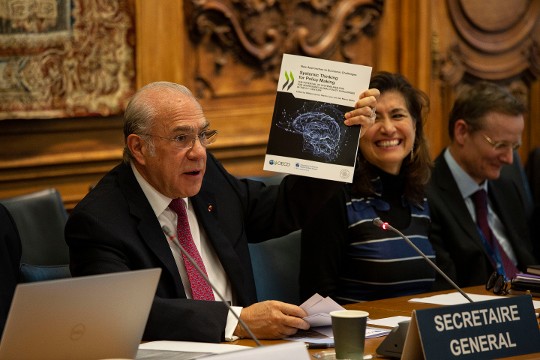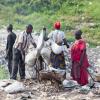
Putting systemic thinking at the centre of policymaking will be essential to address global issues in an era of rapid and disruptive change, according to a new joint report by IIASA and the Organisation for Economic Co-operation and Development (OECD).
The impacts of the corona virus on people’s health and daily life, stock markets, and businesses illustrate the increasingly interconnected nature of the challenges facing governments around the world. Systemic thinking for policymaking: The potential of systems analysis for addressing global policy challenges in the 21st century, aims to highlight to policymakers how systems research can be used to understand the complex issues facing society, anticipate the consequences of our decisions, and build resilience.
The authors argue that, to tackle planetary emergencies linked to the environment, the economy, and sociopolitical systems, policymakers need to understand their systemic properties, including tipping points, interconnectedness, and resilience.
"The systems approach can promote cross-sectoral, multidisciplinary collaboration in the process of policy formulation by taking proper account of the crucial linkages between issues generally treated separately within different specialisations and scientific and institutional "silos"," said Gabriela Ramos, OECD Chief of Staff. "The approach provides a methodology to achieve a better understanding of the non-linear behaviour of complex systems and improve the assessment of the consequences of policy interventions. The ultimate objective is to improve the capacity of policies to deliver better outcomes for people."
"Unless we adopt a systems approach, unless we employ systems thinking, we will fail to understand the world we are living in. This is a world made up of complex systems, systems of systems interacting with each other, and changing each other by that interaction and the links between them. If we are to tackle these issues, governments must change the ways in which they make and implement policies. An acceptance of complexity shifts governments from a top-down siloed culture to an enabling culture where evidence, experimentation, and modeling help to inform and develop stakeholder engagement and buy-in," adds IIASA Director General Albert van Jaarsveld.
"The report shows the considerable potential of mainstreaming systemic thinking into policymaking, including within the OECD itself. As part of an agreed work program between the two organizations, the aim is to establish specific bilateral projects in the different areas of policymaking," says Acting Chief Operations Officer of IIASA, Jan Marco Müller.
The report highlights the application of systems thinking beyond the fields of analysis, modeling, and the formulation of policy, and that systems thinking has immediate application in developing human capital through education, training, and team building. Perspectives are drawn from a range of disciplines and methodologies including economics, social science, and policymaking, but also from the physical and biological sciences and engineering. The authors show how cross-sectoral, multidisciplinary collaboration can take account of the crucial linkages between issues generally treated within different specializations, and scientific and institutional silos.
Closer trade cooperation in combination with robust land use strategies could, for instance, increase the resilience of global food markets to the impacts of climate change, while an integrated approach to the management of water, energy, and land would provide experts and policymakers with a better understanding of the benefits and challenges of sustainably meeting future demand for resources. Another example cited in the report is the link between education and demographic change, where the authors highlight how lifelong education strategies, starting from early childhood, can promote productive working lives and healthy ageing.
 © OECD – Julien Daniel
© OECD – Julien Daniel
Angel Gurría, Secretary-General of the OECD
Research partner: The Organisation for Economic Co-operation and Development (OECD)
Reference:
Hynes W, Lees M, & Müller JM (eds.) (2020), Systemic Thinking for Policy Making: The Potential of Systems Analysis for Addressing Global Policy Challenges in the 21st Century, New Approaches to Economic Challenges, OECD Publishing, Paris https://doi.org/10.1787/879c4f7a-en [pure.iiasa.ac.at/16319]
News

05 June 2024
The 2024 State of CDR Report: Scaling up CO2 removal to meet Paris Targets

23 April 2024
US Permanent Representative to International Organizations in Vienna visits IIASA

15 April 2024
